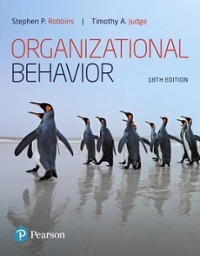Weve identified how some of the characteristics we use to describe individuals can also describe teams. For
Question:
We’ve identified how some of the characteristics we use to describe individuals can also describe teams. For example, individuals can be high in the trait of openness, as can a team. Along the same lines, have you noticed that some teams seem to be smart, while others seem, um, dumb? This characteristic has nothing to do with the average IQ of the team members but instead reflects the functionality of the whole team. Teams that are synergistic excel in logical analysis, brainstorming, coordination, planning, and moral reasoning. And teams that are dumb? Think of long unproductive meetings, social loafing, and interpersonal conflicts.
You might be remembering a few teams you’ve witnessed that are in the dumb category, but we hope you can think of a few that excelled. Smart teams tend to be smart in everything—for any task, they will find a workable solution. But what makes them smart? Researchers in a Massachusetts Institute of Technology (MIT) study grouped 697 subjects into teams of 2 to 5 members to solve tasks, looking for the characteristics of smart teams (they weren’t all smart). Here are the findings:
1. Smart teams did not allow individual members to dominate. Instead, there were more equal contributions from members than in other teams. 2. Smart teams had more members who were able to read minds. Just kidding! But the members were able to read complicated emotions by looking into the eyes of others. There is a test for this ability called Reading the Mind in the Eyes. 3. Smart teams had more women. It’s not that smart teams had more gender equality; these teams simply had more women. This result might be partly due to the fact that more women scored higher in the Reading the Mind in the Eyes test.
Questions
1. From your experiences in teams, do you agree with the researchers’ findings on the characteristics of smart teams? Why or why not?
2. On the highly functioning teams in which you’ve been a member, what other characteristics might have contributed to success?
3. The authors who suggested that membership in a team makes us smarter found that teams were more rational and quicker at finding solutions to difficult probability problems and reasoning tasks than were individuals. After participation in the study, team members were much better at decision making on their own, even up to 5 weeks later. Do you think this spillover effect would happen equally for people in smart teams and dumb teams? Why or why not?
Step by Step Answer:

Organizational Behavior
ISBN: 9780134729329
18th Edition
Authors: Stephen RobbinsTimothy JudgeTimothy Judge, Timothy Judge





